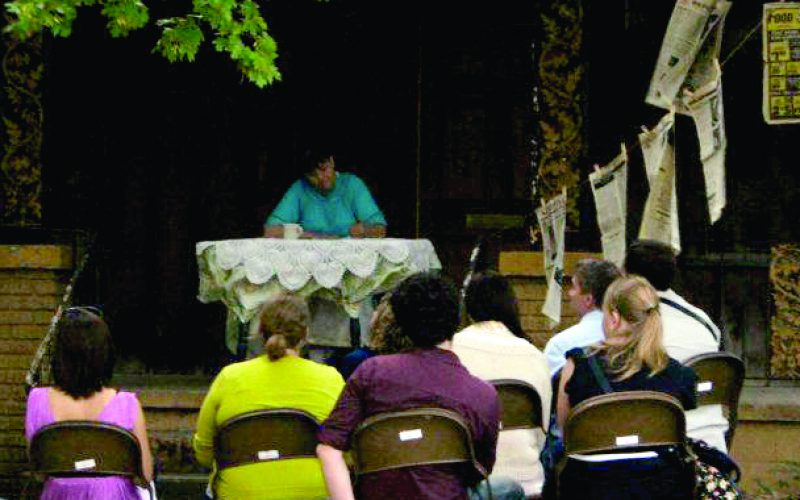Storyteller Kathy McGregor and local actor, producer and teaching artist Erika Wilhite are working on a project for — and in cooperation with — the incarcerated women of Washington County.
Their aim is to give “a voice to the voiceless,” and using book
discussions, creative writing workshops and all manner of storytelling modes, learn the stories of these women and understand the steps and circumstances that led to their confinement. Then, using the original poetry and prose created in the writing workshops, Wilhite, McGregor and the Artist’s Laboratory Theatre will build the body of work into a theatrical performance, bringing the identities, untold stories and unspoken yearnings of these women to life. The work will be performed inside the jail in early October.
The goals of the project include the exploration of the relationship between “art therapy” and recidivism (the universal hope is the workshops and the performance can help foster a reduction) and a cultivation of a greater public understanding of these women as more than just numbers and statistics.

Photo by Sabine Schmidt: From the production “Alley 38,” a previous project written by Erika Wilhite of Artist's Laboratory Theatre, in which Kathy McGregor performed. Shown is actor Jordan Scott.
“It’s compassion, and as a society, we don’t offer it freely,” said Wilhite. “We’re presented these crime stories in the news as though they’re black and white. But these stories are never just black and white.”
The art therapy sessions have taken a variety of forms. For one session, the women were given a copy of “Their Eyes Were Watching God” by Zora Neale Hurston, and then after reading it, they met again for a group discussion of the novel. “And they really got it,” said McGregor. “They really went deep into discussing Janie and the symbolism of her relationships.”
Some literary pieces and poems are resonating strongly with the group; Wilhite and McGregor continue to meet with the women twice a week for an hour and a half each time, slowly earning their trust and continuing to learn their stories, learning who they are as individuals and who they are outside the prison walls.
“You can’t just go up to these women and say, ‘Tell me your life story,’” said Wilhite. “You have to crack it out of them with a poetry exercise. And what’s great is you don’t even have to have finished high school for it. You don’t even have to be able to formulate a proper sentence, because poetry lives and thrives in the breaking of these grammatical rules.”

Courtesy photo: The Artist’s Laboratory Theatre Sheet Short Experience March 2011 — a staged reading of found content, performed in a giant sheet fort. It was a project created by storyteller Kathy McGregor. Featured in photo: Tobias Wray, Christy Hall, Erika Wilhite, Sean Phillip Mabrey, Darcy Ames Harris and Thomas Hunter.
Local musician Shannon Wurst also accepted the offer to come and perform during one of the sessions. She laid down the framework for a songwriting workshop, and collectively, the group wrote and composed a song called “The Lullaby From Prison,” which Wurst will perform in the prison on the same night as the Artist’s Laboratory Theatre’s performance.
“Shannon was incredible,” said McGregor. “She was just fantastic. And they said you could hear the women singing the chorus of the song back in their cells, long after we had finished the session.”
McGregor first got involved in this kind of art therapy with her friend Elaine, who has been doing writing workshops with nonviolent offenders in Shelby County for a few years.
When McGregor looked to Fayetteville to start a similar project, she came across The Artist’s Laboratory Theatre’s “Sheet Fort” storytelling project. Sheet Fort’s premise was to tell stories from “found sources,” such as Craigslist ads, love letters and lists, paying tribute to anonymous people who left their legacy in forms both ephemeral and cyber. Wilhite, the artistic director of the ALT, compiled and edited these found materials into a script, which was then brought to life by the entire company.
Seeing this, McGregor asked Wilhite to come onto her project as a collaborator, to compile and edit the original creative work of the imprisoned women into a linear theatrical presentation.
“We wouldn’t even want to do this if they couldn’t see the performance at the end of it,” said McGregor.
“Because then it would be for us,” continued Wilhite, “and it’s not for us, it’s for them. I want them, through drama, to arrive at the sense of truthfulness that is required for a performance. And that’s why I do this; it’s how I become fully alive.”
“And these women, they aren’t bad people,” continued McGregor. “They’re all nonviolent offenders. I don’t know how I didn’t end up in prison. I came from shit; I just barely squeaked through, and it’s all just luck. My life isn’t that much different from theirs at all, but for some reason I’ve had this grace. But, I can’t continue to keep this grace unless I keep giving it away.”












